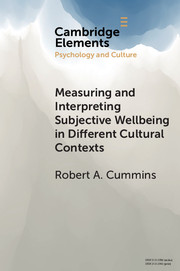Refine search
Actions for selected content:
1 results

Measuring and Interpreting Subjective Wellbeing in Different Cultural Contexts
- A Review and Way Forward
-
- Published online:
- 24 May 2018
- Print publication:
- 17 May 2018
-
- Element
- Export citation
